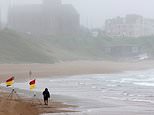UK weather: Hayfever sufferers face ‘thunder fever’ hell with ‘very high’ pollen counts
Brace for ‘thunder hay fever’ hell: Millions of allergy sufferers face days of misery from tomorrow when storms and heavy downpours cause huge surge in ‘super pollen’ counts
UK will face ‘unseasonably’ strong winds later this week as ex-tropical storm Alex brings 45mph gustsHayfever sufferers are warned pollen counts will be ‘high’ or ‘very high’ in all of England and Wales by FridayStorm will have lost most of its power by the time it reaches UK but there will be enough left for high windsSouthern and eastern England will face ‘medium’ pollen counts today, before it will be ‘very high’ by tomorrow
<!–
<!–
<!–<!–
<!–
(function (src, d, tag){
var s = d.createElement(tag), prev = d.getElementsByTagName(tag)[0];
s.src = src;
prev.parentNode.insertBefore(s, prev);
}(“https://www.dailymail.co.uk/static/gunther/1.17.0/async_bundle–.js”, document, “script”));
<!–
DM.loadCSS(“https://www.dailymail.co.uk/static/gunther/gunther-2159/video_bundle–.css”);
<!–
Millions of hayfever sufferers in Britain were warned today that a high pollen count and thunderstorms will trigger a weather phenomenon known as ‘thunder fever’ as the remnants of a tropical storm lash the country.
The UK will face ‘unseasonably’ strong winds later this week as ex-tropical storm Alex brings 45mph gusts in some areas – and pollen counts will be pushed to ‘high’ or ‘very high’ in all of England and Wales by Friday.
Storm Alex caused disruption across Florida, bringing 5.2in (133mm) of rain. After tracking across the Atlantic it will have lost most of its power by the time it reaches Britain – but there will be enough left for high winds.
Southern and eastern England will face ‘medium’ pollen counts today, before it will be ‘very high’ by tomorrow and then across most of England by Friday. It will be ‘low’ in Scotland, ‘medium’ in Northern Ireland and ‘high’ in Wales.
Airbourne allergens expert Max Wiseberg, creator of the HayMax allergen barrier balm, said: ‘With this fine weather thunderstorms are also predicted, and they can bring problems for hayfever sufferers.
Miserable conditions on Tynemouth beach in North Tyneside this morning as wind and rain keep beachgoers away
A swimmer goes into the sea off Tynemouth beach in North Tyneside this morning amid wet and windy conditions
Swimmers off Tynemouth beach in North Tyneside today amid unseasonal conditions in the North East
‘Very high pollen counts are predicted across many parts of England from Thursday onwards causing havoc for the millions of hay-fever sufferers in the UK. Predicted thunderstorms won’t give respite, as instead they can cause a phenomenon known as ‘thunder fever’.’
He cited a report in The European Respiratory review which found humidity breaks pollen grains into smaller allergenic particles, which turn into what has been dubbed a ‘super pollen’.
Mr Wiseberg continued: ‘This appears to be more allergenic than normal pollen, causing more severe reactions in sufferers. Storms bring pollen grains down which might have otherwise risen above head height out of harm’s way and whipping up pollen grains and fungal spores near the ground.’
From tomorrow, weaker rain will move from West to East, with ex-tropical storm Alex bringing low pressure.
On Friday, winds will begin to strengthen across the UK and some showers are to move into the western parts of the UK, particularly the North West, which includes Northern Ireland, western Scotland and parts of northern England.
Oli Claydon, a Met Office spokesman, said: ‘The wind is the main part of the story – unseasonably strong winds for the time of year. We could see gusts of up to 45mph through Friday.
‘Those sorts of wind speeds will be fairly confined to the far north-west of the UK, but as the low pressure goes over the north of the UK through Saturday, a wider area of the north of the UK could see those sorts of wind speeds.
‘It will be windy everywhere across the UK, but the further south you go, the less influence the low pressure will have.’
Mr Claydon added that the ex-storm will largely lose its strength as it progresses into the weekend and that ‘it doesn’t have its regular tropical properties in terms of strength’.
![]()


